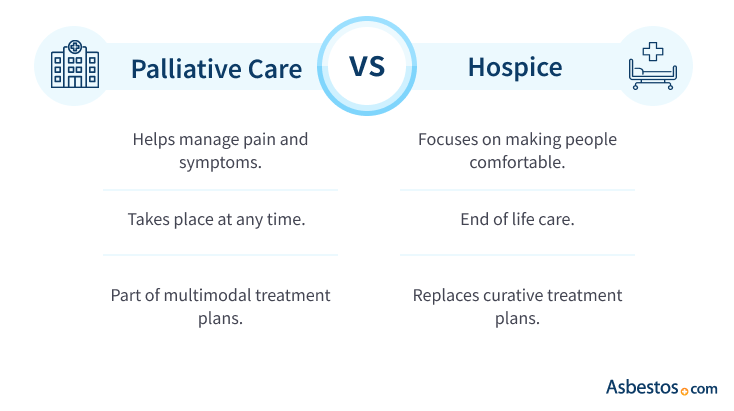Get in Touch
Have questions? Call or chat with our Patient Advocates for answers.
Palliative care mesothelioma treatment options include surgery, radiation, chemo and immunotherapy. The focus is on managing pain and other cancer symptoms to improve quality of life. Early palliative treatments offer the best chance of relieving symptoms.
Written by Dr. Kristopher Bunting | Medically Reviewed By Dr. Andrea Wolf | Edited By Walter Pacheco | Last Update: November 11, 2024
Palliative treatment can control symptoms and improve quality of life and survival for mesothelioma patients. It particularly benefits late-stage patients coping with pain. A 2023 study in the British Journal of Community Nursing said palliative care even helps early-stage mesothelioma patients.
A 2022 study published in the journal In Vivo showed palliative treatment can extend life. Early use of palliative care improved overall survival. Other studies show it improves prognosis, life expectancy and overall survival. Symptom management, including loss of appetite, also improves.
Palliative treatment aimed at minimizing mesothelioma symptoms can benefit well-being and survival. An Australian study found that palliative treatment for poor appetite improved survival rates.
Both palliative and hospice care for mesothelioma patients aim to improve quality of life and comfort. But they aren’t the same types of care. Hospice care is for people with a life expectancy of 6 months or less. It doesn’t include curative treatment. Palliative care happens in conjunction with cancer treatment.

Surgery, radiation, chemotherapy and medication can all be part of palliative treatment. Therapies can improve breathing and reduce excess fluid in the chest and abdomen.
“There’s still a lot of confusion about what palliative treatment is versus hospice care,” says Patient Advocate Karen Selby of The Mesothelioma Center. “I find it important to explain what palliative care is and how patients typically do better integrating it early on rather than waiting.”

Learn expert insights from two top mesothelioma specialists and a 9-year pleural survivor who beat the odds.
Get a RecordingOncologists, surgeons, nurse specialists, pain specialists, physical therapists and dietitians offer mesothelioma palliative care. It requires a team approach to ensure that a patient’s needs are addressed. Addressing stress, depression, anxiety and fear can improve quality of life.
Mental health experts, patient advocates and spiritual advisors can also help. Mesothelioma survivor Michael Cole says mental health support helped ease his symptoms. He explained, “It had become almost impossible for me to sleep, and I began using mild medication to help.”
“My thoracic surgeon recommended I speak with a psychiatrist,” Cole said. “[They] explained how trauma to the body interacts with brain function, which can result in a loop effect causing more pain and stress.”
Palliative care can take place in a hospital, cancer center, long-term care facility or at home. Cancer centers specialize in meeting the unique needs of cancer patients. You have a variety of options when choosing where to receive palliative care.
The best palliative treatment depends on the type of mesothelioma and your symptoms. The stage also plays a role. Your medical team can advise which treatments will benefit you the most.
Mesothelioma treatment options can cause side effects. Palliative care can help keep them in control. While side effects are temporary, you should discuss their potential with your doctor.
Palliative treatment may also involve more than one type of medical care. Multimodal therapy is common in both curative and palliative mesothelioma care
Palliative surgery for mesothelioma can relieve the symptoms caused by fluid build-up like pleural effusions. Fluid accumulation can cause difficulty breathing, pain and other complications.
Fluid-Draining Procedures
Cytoreductive surgery is invasive surgery to remove as much of the tumor as possible. It can have a palliative effect by controlling symptoms.
Chemotherapy is an anti-cancer treatment for mesothelioma, but it can also play a role in palliative care. The side effects of chemotherapy can be harsh. Medications can reduce the negative effects, so patients can benefit from chemo.
Chemotherapy Administration
Chemotherapy is most often used on its own but is also used following surgery. HIPEC can extend life expectancy for mesothelioma patients. HITHOC hasn’t been found to provide as much benefit but can be beneficial for some patients.
Immunotherapy can improve mesothelioma survival and quality of life. Many patients experience fewer side effects compared to chemo.
Some palliative treatments can affect immunotherapy. Opioids prescribed for pain and corticosteroids for inflammation have immunosuppressive effects. The impact of antibiotics on healthy gut bacteria may impact immunotherapy.
Radiation can shrink tumors, helping to relieve the pain they can cause. While it can cause skin irritation and fatigue, it’s useful for improving quality of life.
Radiation is used almost exclusively in pleural mesothelioma. It does not work for pericardial cases and is hard to use in peritoneal mesothelioma.

Access safe, effective exercises to enhance your well-being and improve your quality of life.
Get Your Free GuideSurgery and medication can help relieve certain types of mesothelioma pain. Mild pain may be treated with over-the-counter pain relievers such as acetaminophen. More severe pain is usually treated with opioid drugs. Examples include morphine, oxycodone or tramadol. IV pain medication may be needed for severe pain.
Other pain management techniques can be helpful as well. While pain originates in the body, it’s interpreted in the brain. Cognitive and behavioral techniques may help you manage your pain.
Mesothelioma Pain Management
Palliative care may improve your symptoms and even increase mesothelioma life expectancy. Complementary and alternative medicine isn’t recommended to replace traditional treatment. But it may offer symptomatic relief and improve your quality of life.
Many patients find relief with a holistic approach to palliative care. Some combine medication for anxiety and depression along with talk therapy and yoga.
A mesothelioma cancer patient can improve their diet with the supervision of a licensed dietitian. Nutrition supports mesothelioma treatment, helping the body heal and sustain the immune system.
If you have mesothelioma, eating more produce can help to build a healthy body. Research shows that fruits and vegetables can help fight cancer.

A mesothelioma diet combined with prescription drugs can improve nutrition. Drugs can help increase appetite and treat nausea and vomiting. Consult a licensed dietitian and your treatment team before making changes.
Recommended ReadingYour web browser is no longer supported by Microsoft. Update your browser for more security, speed and compatibility.
If you are looking for mesothelioma support, please contact our Patient Advocates at (855) 404-4592
The Mesothelioma Center at Asbestos.com has provided patients and their loved ones the most updated and reliable information on mesothelioma and asbestos exposure since 2006.
Our team of Patient Advocates includes a medical doctor, a registered nurse, health services administrators, veterans, VA-accredited Claims Agents, an oncology patient navigator and hospice care expert. Their combined expertise means we help any mesothelioma patient or loved one through every step of their cancer journey.
More than 30 contributors, including mesothelioma doctors, survivors, health care professionals and other experts, have peer-reviewed our website and written unique research-driven articles to ensure you get the highest-quality medical and health information.
My family has only the highest compliment for the assistance and support that we received from The Mesothelioma Center. This is a staff of compassionate and knowledgeable individuals who respect what your family is experiencing and who go the extra mile to make an unfortunate diagnosis less stressful. Information and assistance were provided by The Mesothelioma Center at no cost to our family.LashawnMesothelioma patient’s daughter


Bunting, K. (2024, November 11). Managing Mesothelioma Pain with Palliative Treatment. Asbestos.com. Retrieved November 14, 2024, from https://www.asbestos.com/treatment/palliative/
Bunting, Kristopher. "Managing Mesothelioma Pain with Palliative Treatment." Asbestos.com, 11 Nov 2024, https://www.asbestos.com/treatment/palliative/.
Bunting, Kristopher. "Managing Mesothelioma Pain with Palliative Treatment." Asbestos.com. Last modified November 11, 2024. https://www.asbestos.com/treatment/palliative/.
A medical doctor who specializes in mesothelioma or cancer treatment reviewed the content on this page to ensure it meets current medical standards and accuracy.
Please read our editorial guidelines to learn more about our content creation and review process.
Dr. Andrea Wolf is the Director of the New York Mesothelioma Program at Mount Sinai in New York City. She focuses on multidisciplinary treatment, clinical research, community outreach and education.
Mesothelioma Center - Vital Services for Cancer Patients & Families doesn’t believe in selling customer information. However, as required by the new California Consumer Privacy Act (CCPA), you may record your preference to view or remove your personal information by completing the form below.
